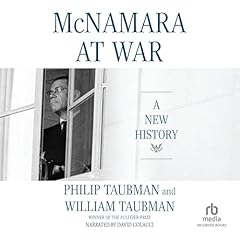
The Most Powerful Court in the World
A History of the Supreme Court of the United States
No se pudo agregar al carrito
Add to Cart failed.
Error al Agregar a Lista de Deseos.
Error al eliminar de la lista de deseos.
Error al añadir a tu biblioteca
Error al seguir el podcast
Error al dejar de seguir el podcast
 Exclusivo para miembros Prime: ¿Nuevo en Audible? Obtén 2 audiolibros gratis con tu prueba.
Exclusivo para miembros Prime: ¿Nuevo en Audible? Obtén 2 audiolibros gratis con tu prueba.Compra ahora por $30.76
-
Narrado por:
-
Graham Winton
-
De:
-
Stuart Banner
Will abortion be legal? Should people of the same sex be allowed to marry? May colleges prefer black applicants over white ones? These are among the most bitterly contested issues in the United States today. We answer these questions, and many more, by presenting them to nine lawyers—the justices of the Supreme Court of the United States. No other nation commits so many important questions to its highest court.
Stuart Banner’s The Most Powerful Court in the World is an authoritative history of the United States Supreme Court from the Founding era to the present. Not merely a history of the Court’s opinions and jurisprudence, it is also a rich account of the Court in the broadest sense—of the sorts of people who become justices and the methods by which they are chosen, of how the Court does its work, and of its relationship with other branches of government. It is about how the Court acquired so much power, how it has retained its power in the face of repeated challenges and criticisms, and what it has done with its power over the years. Rather than praising or criticizing the Court’s decisions, Banner makes the case that one cannot fully understand the decisions without knowing about the institution that produced them.
Offering a fresh analytical window into today’s contentious debates about the Court—debates that often rest on dubious ideas about the Court’s history—The Most Powerful Court in the World helps listeners see cases through the justices’ eyes.
“Stuart Banner’s book is a study of the court that situates this institution firmly in both its social and human context. It is also, in my opinion, the most interesting, the most readable, and the most insightful history of the court yet produced. Congratulations goes to Stuart Banner for this tremendous achievement.”—Lawrence Friedman, Marion Rice Kirkwood Professor of Law, Emeritus, Stanford Law School
Los oyentes también disfrutaron:




















Las personas que vieron esto también vieron:





The Supreme Court cases about the Amish.
Se ha producido un error. Vuelve a intentarlo dentro de unos minutos.
I speak as a member of the bar of the Supreme Court, a retired federal judge, and a lifelong Democrat. The Most Powerful Court In the World (an accurate title) It is the first serious nonpartisan book written about the Supreme Court in at least the last 30 years. Chock full of details and yet eminently readable.
Context: Law Professor Banner puts today's Court in its historical context, demolishing the proposition that in the good old days the Court was a quiet and apolitical sanctum of wisdom and that it has only recently become controversial and political. It's been extremely controversial since at least 1803. Banner's recounting of the historical facts (including wonderful anecdotes) lifts the reader from the immediate tumult of 2024 headlines and provides us with the long view of the Court and the evolution of the law and the Court. Examples include:
1. Court packing (it started with John Marshall in 1801) and manipulating the number of Justices to help, or prevent, Presidential agenda's and appointments (1801).
2. Diversity on the Court (regional, religious, racial, gender)
3. Reconstruction and Jim Crow.
4. The Commerce Clause revolution and its sequel.
5. The rise of individual liberty litigation and decisions in the 20th century, starting with the novel idea of applying the Bill of Rights to the States. Religion, free speech, Roe, Dobbs.
5. The winning judicial strategies for challenging racial discrimination, sexual and gender discrimination and LGBTQ+ discrimination cases to the Court and their current erosion. Affirmative action and its demise.
6. The fact that the Court (composed of lawyers who are taught to revere history, precedent and law) has been a conservative institution for its entire history except for 15 years right after FDR when, for a short interval, it moved to the Left.
7. Movements to reform the Court (age limits, more justices, Congressional veto, jurisdiction stripping) have been perennial. Including Biden's Presidential Commission Report of 2021.
8. The fact that the Justices are human beings who have hobnobbed with the President, VP, Senators, Politicos and Business people forever. Frankfurter played poker with FDR, Douglas took a $12,000 per year salary from the owner of a Las Vegas Casino, Fortas took $20,000 per year from Louis Wolfson, who was later convicted and sent to prison. Spouses who worked for law firms that appeared before the Court.
The reader will note that in his discussion of every case, especially the modern ones, Professor Banner provides a representative and pithy quote from the Majority decision and from the dissent. He recounts them fairly and does not take sides. He lets the reader think about it.
This book is a delightful change from the norm for modern SCOTUS literature - which is either a partisan hatchet job by a journalist or professor, a compendium of gossip from the law clerks willing to talk, or the warm and neutral memoire or musings of a current Justice trying to make a buck or a former Justice burnishing his or her place in history. Banner gives you as straight, objective and unvarnished a history as you are likely to get these days. It is not a hit-job. It is not a hagiography.
The Most Powerful Court in the World should be required reading for any student of the Supreme Court.
Fascinating & Impartial History of SCOTUS
Se ha producido un error. Vuelve a intentarlo dentro de unos minutos.
Greatness
Se ha producido un error. Vuelve a intentarlo dentro de unos minutos.
History
Se ha producido un error. Vuelve a intentarlo dentro de unos minutos.


